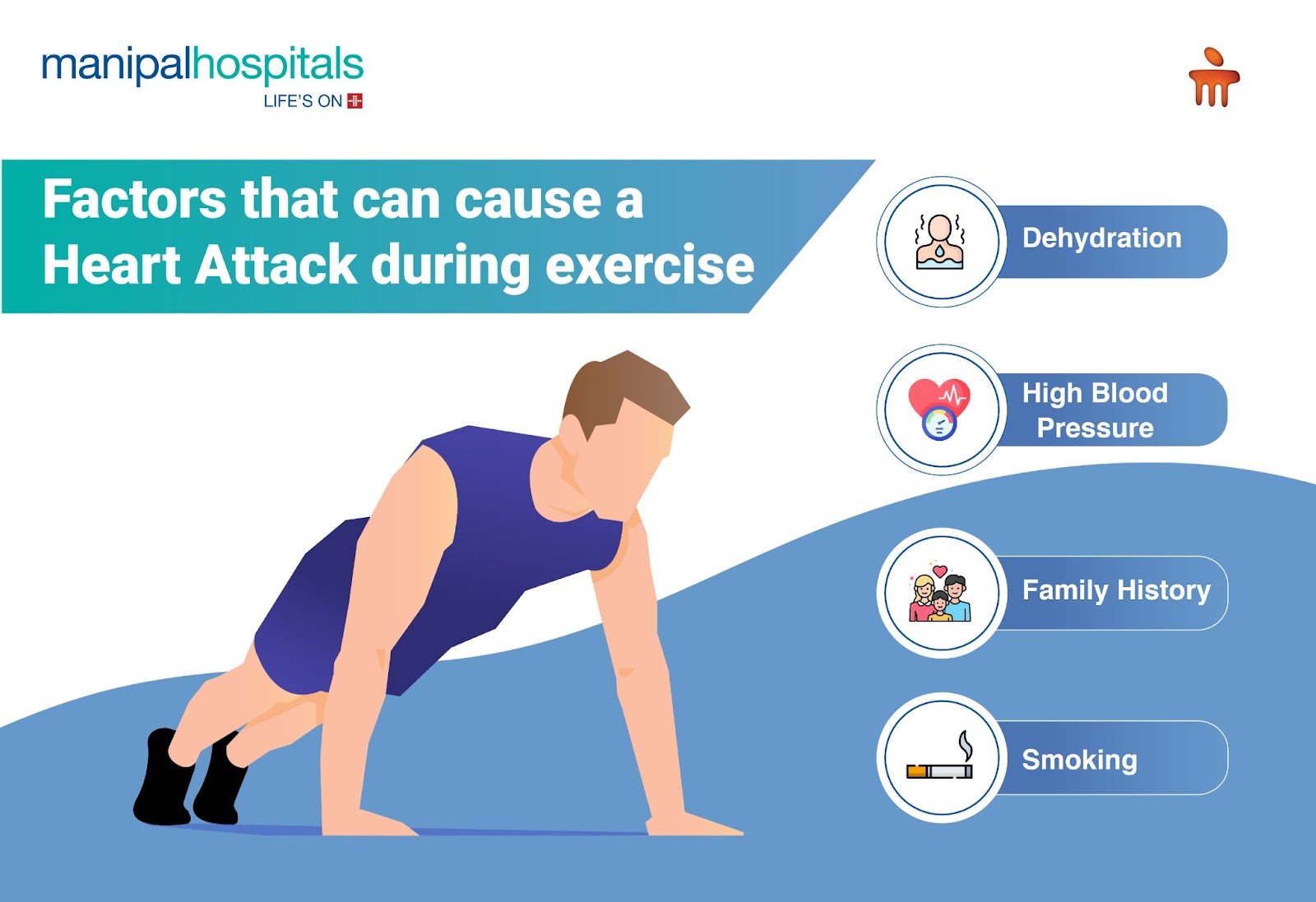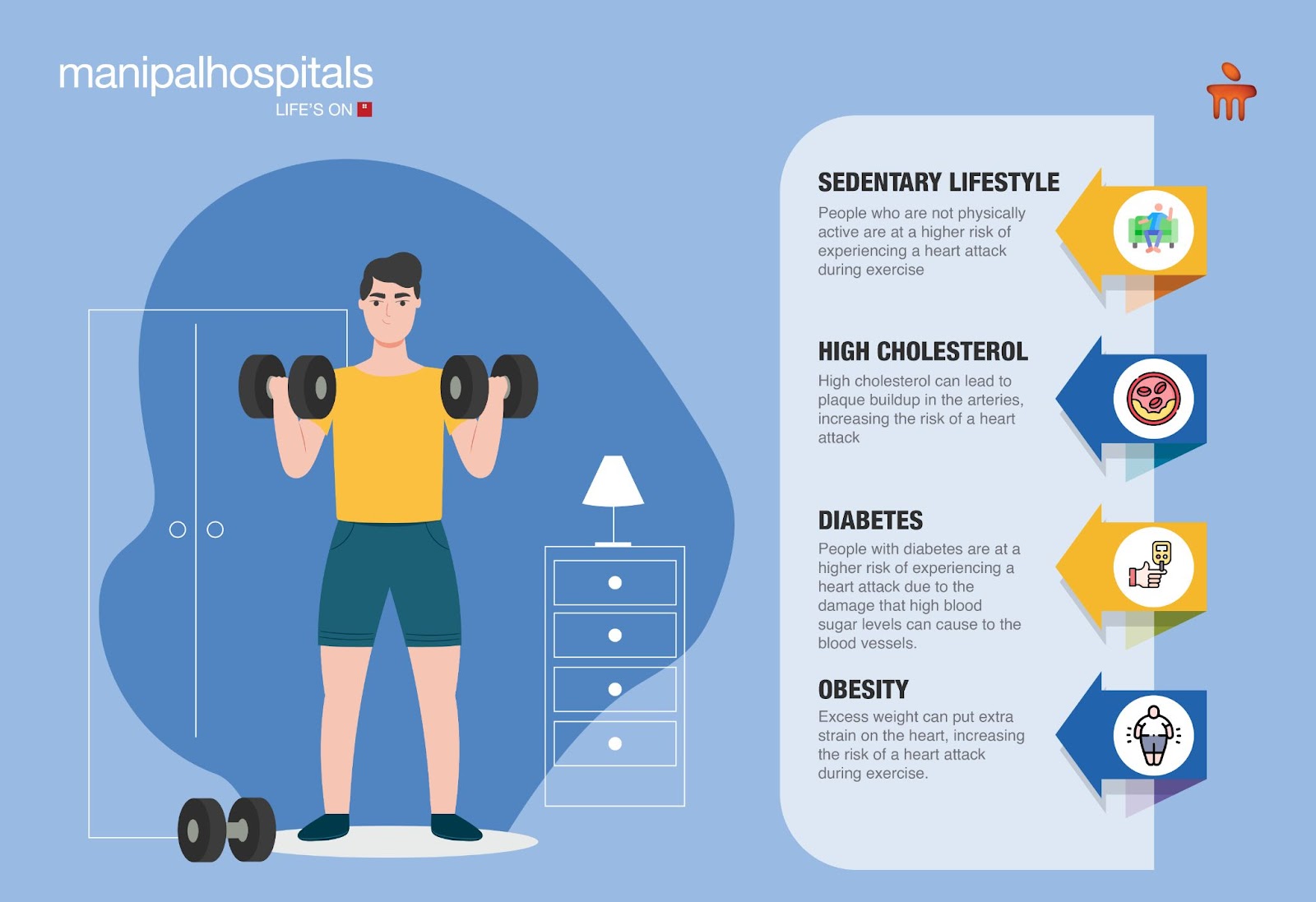
Exercise is essential for maintaining a healthy heart, but it can also lead to a heart attack. When a heart attack occurs during exercise, it can be a frightening and life-threatening experience. A heart attack occurs when the blood flow to the heart is blocked, usually by a blood clot. During exercise, the heart is working harder and requires more oxygen and nutrients. If the blood vessels leading to the heart are already narrowed due to plaque buildup, the heart may not receive enough blood and oxygen, leading to a heart attack.
Certain individuals are more susceptible to experiencing a heart attack during exercise. Those with pre-existing heart conditions, such as coronary artery disease or arrhythmias, face a higher risk. Additionally, individuals with a family history of heart disease, smokers, and those with diabetes or high blood pressure may be predisposed. Such individuals need to be vigilant about their cardiovascular health and undergo regular medical check-ups.
In this blog post, we will explore everything about exercise and heart attacks - the causes and risks of heart attacks during exercise.
Synopsis
Causes and Risks of Heart Attack
The factors that can cause a heart attack during exercise include:

1. Dehydration: When the body is dehydrated, it can lead to an increase in heart rate and decreased blood volume, which can strain the heart.
2. High Blood Pressure: High blood pressure can create an extra workload on the heart, making it hard for the heart to pump blood efficiently.
3. Family History: If you have a family history of heart disease or heart attacks, you may be more susceptible to experiencing a heart attack during exercise.
4. Smoking: Smoking can damage the blood vessels, making it easier for plaque to build up and block the flow of blood to the heart.
Other factors that can increase the risk of experiencing a heart attack during exercise include:

1. Sedentary Lifestyle: People who are not physically active are at a higher risk of experiencing a heart attack during exercise.
2. High Cholesterol: High cholesterol can lead to plaque buildup in the arteries, increasing the risk of a heart attack.
3. Diabetes: People with diabetes are at a higher risk of experiencing a heart attack due to the damage that high blood sugar levels can cause to the blood vessels. Consult with the top Cardiologists at Manipal Hospitals to stay updated on your heart health condition.
4. Obesity: Excess weight can put extra strain on the heart, increasing the risk of a heart attack during exercise.
Regular exercise is essential for maintaining a healthy heart and reducing the risk of heart disease. However, it is essential to take precautions and understand the risks of experiencing a heart attack during exercise. If you have a history of heart disease or other risk factors, it is important to consult with your doctor before starting an exercise program. By taking the necessary precautions and understanding the risks, you can safely enjoy the benefits of exercise and maintain a healthy heart.
FAQ's
A heart attack during exercise can result from various factors. Underlying heart conditions, such as coronary artery disease, can lead to reduced blood flow to the heart muscle. A cardiac angiogram coronary is to detect these symptoms at the early stage. Plaque buildup in the arteries may rupture during strenuous activity, causing a blood clot that can block the flow of blood to the heart. Additionally, engaging in intense physical exertion without proper conditioning or pushing beyond one's physical limits can contribute to the risk.
Distinguishing between normal exercise discomfort and potential heart attack symptoms is crucial. While it's normal to experience increased heart rate and fatigue during exercise, warning signs like persistent chest pain or discomfort, shortness of breath, nausea, and lightheadedness should not be ignored. If any doubt arises, for preventing heart attacks, it is imperative to seek immediate medical attention rather than dismissing symptoms as routine exercise strain.
While age can be a factor, it's essential to recognize that individuals of all ages should be aware of their heart health. While the risk of heart attack generally increases with age, younger individuals can also experience cardiac issues, particularly if there are underlying health conditions. Regular health check-ups and consultations with healthcare professionals are important for people of all age groups to monitor and manage their cardiovascular health effectively.
Resuming exercise after recovering from a heart attack requires careful consideration and professional guidance. Consultation with a healthcare provider is essential to assess the individual's cardiac health and determine a safe and personalized exercise plan. The healthcare team will consider factors such as the severity of the heart attack, overall health, and any recommended lifestyle modifications. A gradual and monitored approach to reintroducing physical activity is typically advised to ensure the individual's safety and optimal recovery.
Yes, stress and emotional factors can contribute to a heart attack during exercise. Emotional stress triggers the release of hormones that can strain the cardiovascular system. Individuals experiencing chronic stress may have higher blood pressure and an increased risk of heart disease. Managing stress through relaxation techniques, mindfulness, and other stress-reducing strategies is crucial for avoiding heart attacks. Incorporating these practices into one's lifestyle can help minimise the impact of emotional factors on cardiovascular well-being.
If someone experiences symptoms of a heart attack during exercise, immediate action is vital. Stop the activity and prioritise calling emergency services. Quick intervention is critical for better outcomes. If an automated external defibrillator (AED) is available, use it according to instructions. Recognising the signs, acting promptly, and seeking professional medical assistance can significantly improve the chances of survival and minimise potential cardiac damage.
Lifestyle modifications are fundamental in avoiding heart attacks during exercise. Adopting a heart-healthy lifestyle involves maintaining a balanced and nutritious diet, engaging in regular physical activity, maintaining a healthy weight, and avoiding tobacco products. These habits contribute to overall cardiovascular well-being, reducing the risk of underlying conditions that can lead to a heart attack during exercise. Additionally, stress management through relaxation techniques and mindfulness plays a crucial role in maintaining a healthy heart, emphasizing the holistic approach to cardiovascular health.






















 3 Min Read
3 Min Read











